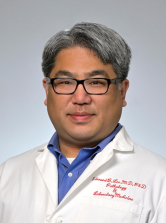
Edward B. Lee, MD, PhD
Professor of Pathology and Laboratory Medicine
Perelman School of Medicine at the University of Pennsylvania
Co-Director, Institute of Aging
Contact InformationPerelman School of Medicine at the University of Pennsylvania
Department of Pathology and Laboratory Medicine
Stellar-Chance Laboratories, Room 613A
422 Curie Blvd
Philadelphia, PA 19104
Tel: 215-898-0908
Email: edward.lee@pennmedicine.upenn.edu
Specialty Division
Neuropathology, Cancer and Immunobiology
Research Expertise
Alzheimer's disease
Frontotemporal lobar degeneration
Amyotrophic lateral sclerosis
Clinical Expertise
Neuropathology
Graduate Groups
Cell and Molecular Biology
Neuroscience
Pharmacology
Education
BS (Biological Sciences), Stanford University, 1997
PhD (Neuroscience), University of Pennsylvania School of Medicine, 2004
MD University of Pennsylvania School of Medicine, 2005
Specialty Certification
American Board of Pathology (Neuropathology), 2009
American Board of Pathology (Anatomic Pathology), 2009
Postgraduate Training
Residency in Anatomic Pathology, Hospital of the University of Pennsylvania, 2005-2007
Fellowship in Neuropathology, Hospital of the University of Pennsylvania, 2007-2009
Postdoctoral Research Fellow, University of Pennsylvania School of Medicine, 2009-2011
Awards and Honors
Departmental Honors in Biological Sciences, Stanford University, 1997
Phi Beta Kappa, Stanford University, 1997
Experimental Pathologist-In-Training Award, American Society for Investigative Pathology, 2005
O.H. Perry Pepper Award for investigative work of exceptional merit and noteworthy competence as a clinician, University of Pennsylvania, 2005
Jesse H. Frank M.D. Prize in Pathology for excellence in research in Pathology and Laboratory Medicine, University of Pennsylvania, 2005
Leonard Jarett Symposium Award, University of Pennsylvania, 2009
Center for Neurodegenerative Disease Annual Retreat Award, University of Pennsylvania, 2010
Thomas B. and Jeannette E. Laws McCabe Fund Fellow Award, University of Pennsylvania, 2011
Excellence in Science Award, American Society for Investigative Pathology, 2012
New Investigator Recognition at the Alzheimer Association's 2013 Rita Hayworth Gala, 2013
Terry Award for Best Neurodegenerative Disease Paper, American Association of Neuropathologists, 2014
Doris Duke Charitable Foundation Clinical Scientist Development Award, 2014
Young Physician-Scientist Award, American Society for Clinical Investigation, 2016
Memberships and Professional Organizations
Society for Neuroscience, 2003 - Present
American Society for Investigative Pathology, 2004 - Present
College of American Pathologists, 2006 - 2011
United States and Canadian Academy of Pathology, 2009 - 2010
American Association of Neuropathologists, 2010 - Present
Medical Research Council, 2012 - 2018
ALS Society of Canada, 2013 - 2013
Memorabel, ZonMw Netherlands, 2014 - 2014
Alzheimer's Disease Center Neuropathology Steering Committee, 2014 - 2017
Department of Defense Study Section, 2015 - 2021
Alzheimer's Association, 2016 - 2018
NIH Study Section, 2016 - Present
AFM-Telethon, 2016 - 2016
American Board of Pathology, 2017 - 2024
MND Association, 2018 - 2019
U.S. Food and Drug Administration, 2020 - 2023
International Society for Frontotemporal Dementias, 2020 - Present
Association for Frontotemporal Degeneration & Alzheimer's Drug Discovery Foundation, 2021 - present
Duke Alzheimer's Disease Research Center, 2022 - 2022
South Texas Alzheimer's Disease Research Center, 2022 - Present
1Florida Alzheimer's Disease Research Center, 2024 - Present
Rainwater Charitable Foundation, 2024 - Present
NIH Study Section, 2025 - 2027
Post-TBI ADRD Subcommittee Member, ADRD Summit, 2025 - 2025
Web Links
Selected Publications
Gains or losses: molecular mechanisms of TDP43-mediated neurodegeneration.
Lee Edward B, Lee Virginia M-Y, Trojanowski John Q, Nature reviews. Neuroscience 13(1): 38-50, 2011, PMID:22127299
Dysregulation of the ALS-associated gene TDP-43 leads to neuronal death and degeneration in mice.
Igaz Lionel M*, Kwong Linda K*, Lee Edward B*, Chen-Plotkin Alice, Swanson Eric, Unger Travis, Malunda Joe, Xu Yan, Winton Matthew J, Trojanowski John Q, Lee Virginia M-Y, The Journal of clinical investigation 121(2): 726-38, 2011, PMID:21206091
C9orf72 hypermethylation protects against repeat expansion-associated pathology in ALS/FTD.
Liu Elaine Y, Russ Jenny, Wu Kathryn, Neal Donald, Suh Eunran, McNally Anna G, Irwin David J, Van Deerlin Vivianna M, Lee Edward B, Acta neuropathologica 128(4): 525-41, 2014, PMID:24806409
Hypermethylation of repeat expanded C9orf72 is a clinical and molecular disease modifier.
Russ Jenny, Liu Elaine Y, Wu Kathryn, Neal Donald, Suh EunRan, Irwin David J, McMillan Corey T, Harms Matthew B, Cairns Nigel J, Wood Elisabeth M, Xie Sharon X, Elman Lauren, McCluskey Leo, Grossman Murray, Van Deerlin Vivianna M, Lee Edward B, Acta neuropathologica 129(1): 39-52, 2015, PMID:25388784
C9orf72 promoter hypermethylation is neuroprotective: Neuroimaging and neuropathologic evidence.
McMillan Corey T, Russ Jenny, Wood Elisabeth M, Irwin David J, Grossman Murray, McCluskey Leo, Elman Lauren, Van Deerlin Vivanna, Lee Edward B, Neurology 84(16): 1622-30, 2015, PMID:25795648


